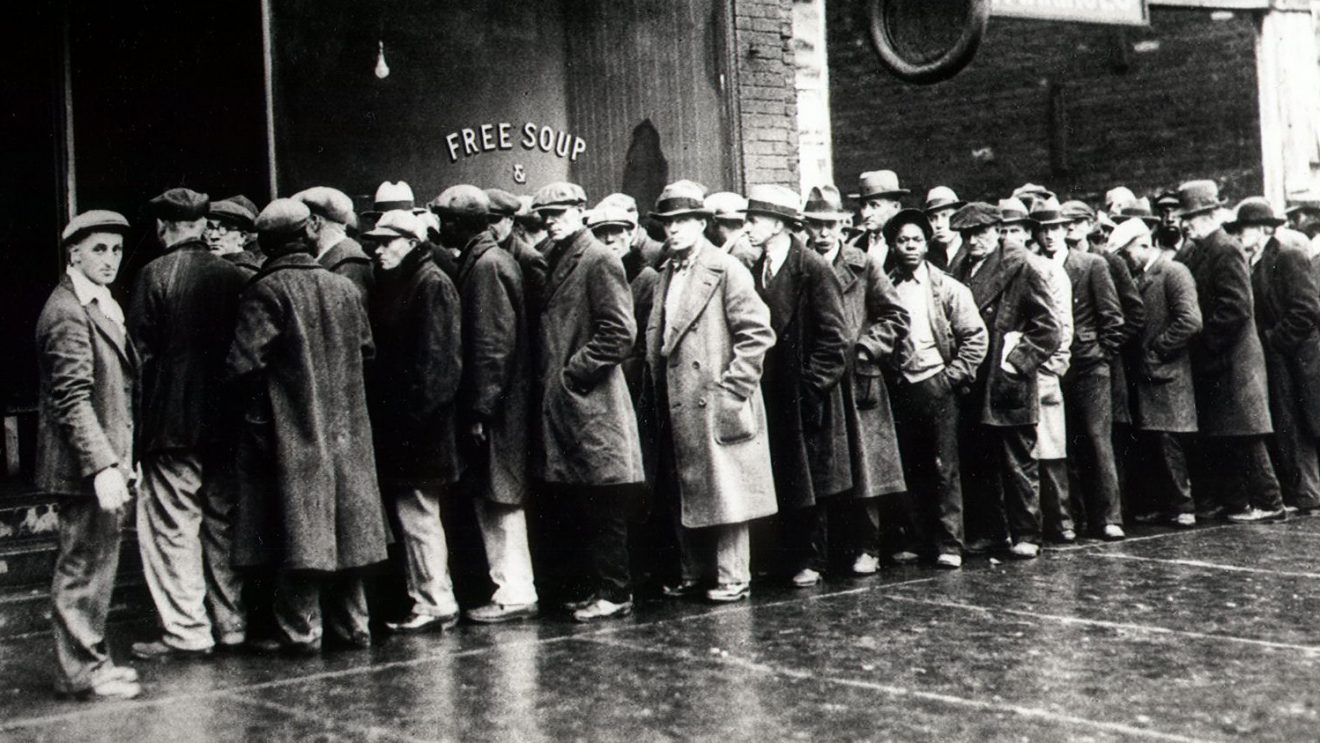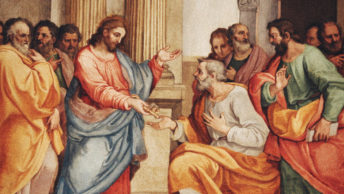There was a Catholic soup kitchen located in Toronto during the difficult days of the Great Depression in the 1930s; it was run by volunteers, and there was always a long line of people waiting on the sidewalk for it to open each morning—every day of the week except Sunday. Many of the people who came each day were unemployed, homeless, or otherwise down-on-their luck; one of the regulars was a streetwalker or woman of the night whom we’ll call Simone. She didn’t hide the fact that she was a prostitute; she was young and still fairly pretty, but already very cynical and tired of life. She would loudly demand to be served ahead of everyone else, since, as she said, she was tired of standing too long after her night’s work—but, of course, Simone had to wait her turn, like everyone else. She had a filthy mouth; cursing came as easily to her as breathing, and when standing in line, she did each in almost equal measure. Newcomers to the soup kitchen, along with pedestrians on the sidewalk, often cringed under her vile and angry words, but everyone else learned to tune out her tirades.
One of the volunteers was a beautiful young woman whom we’ll call Maggie. She wasn’t accustomed to such filthy language and personal abuse, but she always smiled at Simone and put up with her patiently. In fact, Maggie would always say, “Dear, your throat must be raw from all that yelling; here, have something soothing to drink.” This happened day after day, week after week, month after month. Then, one day, Simone came in very quiet and watchful after having waited her turn in line with unaccustomed patience and silence. Looking into Maggie’s beautiful eyes, she asked somewhat timidly why she had put up with her abuse. Why hadn’t she called the cops or had her thrown out? Why was she always so polite and kind? Maggie answered kindly, “Oh, that’s very simple. I love you.” Having known only abuse and rejection in her relationships, Simone was shocked by this completely unexpected answer, and from the depths of her soul cried out, “Me? Why?” Maggie explained very gently, “Because you are Christ to me, because He died for love of both of us, because I am your sister in Him, because I am here to love and serve you.” Simone crumpled to the floor, her body wracked with heart- rending sobs. Maggie bent down and consoled her and embraced her, and finally Simone was able to say, “I never heard such things before, but I know you mean business because . . . because you were always the same toward me; you smiled at me and you didn’t curse me back, but instead gave me food and drink and treated me with a respect I didn’t deserve. I want to love the way you do. Teach me how.”
From then on Simone’s life changed; she gave up her sinful lifestyle, took instructions in the Catholic faith, and went on to be baptized—the first of 17 different street walkers who came to Christ because of Maggie’s simple and compassionate ministry (Catherine de Hueck Doherty, Not Without Parables, p. 69). Jesus is very loving, accepting, and forgiving—and other people should be able to tell that about Him through our example.
There are no limits to God’s willingness to forgive. Many of us have known this truth all our lives, so it’s very easy for us to take it for granted—but it truly is something amazing, and even shocking. The readings for the 11th Sunday in Ordinary Time speak of God’s overwhelming mercy and of His power to touch our hearts and change them forever. As St. Paul says in the Letter to the Galatians, “I have been crucified in Christ; yet I live, no longer I, but Christ lives in me”—in other words, God’s grace can transform us from sinners to saints, making of us a new creation. This was true for David, king of Israel. He sinned terribly by committing adultery with the wife of Uriah, and then by arranging for Uriah to be killed in battle in order to cover up his crime. When accused by the prophet Nathan, however, David immediately and sincerely repented, and he was forgiven—and the Lord later blessed him by making him a forerunner and ancestor of Jesus. The sinful woman mentioned in the Gospel also received mercy because of her genuine repentance; as Jesus said, her many sins were forgiven because of her great love.
The great 13th century mystic St. Gertrude once had a vision of Heaven in which she saw St. Mary Magdalene dressed in a strikingly beautiful robe, dotted with exquisitely glorious flowers. Gertrude asked her guardian angel the meaning of these flowers, and was told that they were Mary Magdalene’s sins after they had been purified by the Blood of the Lamb (Msgr. Arthur Tonne, Stories for Sermons, Vol. 5, #59). Jesus is able to transform great sinners into great saints; His grace not only removes the shame of our sins, but also enables us to grow in the corresponding virtues to a far greater degree than if we had never sinned in the first place. All that’s required is our trust in His mercy, and our willingness to share that mercy with others. The Gospel of Luke (7:36-50), and the story of Simone and Maggie, reminds us that we must never give up on ourselves, nor must we give up on others. If we can take this lesson to heart, we will neutralize two of Satan’s biggest weapons that he delights in using against us: shame, and a judgmental spirit. The devil wants us either to be so ashamed of our own sins that we’re actually afraid to ask God’s forgiveness, or to be so disgusted by the sins of other people that we look down upon them or refuse to have anything to do with them. Both of these attitudes short-circuit the working of God’s grace—but our trusting and loving humility breaks this spiritual logjam, allowing experiences of peace and reconciliation, and even miraculous conversions, to occur.
Maggie could have responded to Simone the same way Simon the Pharisee reacted to the sinful woman, clothing herself in self-righteousness and condemning the woman for her sins. Instead, Maggie treated her as Jesus Himself would have done—and while it was a long time before her example of loving patience took effect, it finally made all the difference. This is a lesson for us. God’s grace can turn wasted lives into valuable ones, make unlovable persons very lovable, and transform sinners into saints—but the Lord is calling us to play our part in this wondrous mystery of grace. Answering this call is one of the most important, and heroic, things we will ever do.








